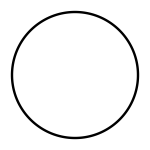We have been raised to believe that the land where we dwell is mixed with the seas to form the shape of a ball we call Earth, and one of the most popular Biblical passages I’ve seen used to defend this notion is Isaiah 40:22.
Have ye not known? have ye not heard? hath it not been told you from the beginning? have ye not understood from the foundations of the earth? It is he that sitteth upon the circle of the earth, and the inhabitants thereof are as grasshoppers; that stretcheth out the heavens as a curtain, and spreadeth them out as a tent to dwell in: That bringeth the princes to nothing; he maketh the judges of the earth as vanity. (Isa 40:21-23 KJV)
First, I would like to address the Hebrew word translated here as “circle”.
Circle vs. Ball
 In most English translations that I have read of this passage, the phrase “the circle of the earth” is used. The Hebrew word translated as “circle” is “chug” (H2329). It appears three times in the Tanakh, with the third time in Isaiah. Here are the other two mentions:
In most English translations that I have read of this passage, the phrase “the circle of the earth” is used. The Hebrew word translated as “circle” is “chug” (H2329). It appears three times in the Tanakh, with the third time in Isaiah. Here are the other two mentions:
(Job 22:14 KJV) Thick clouds are a covering to him, that he seeth not; and he walketh in the circuit of heaven.
(Pro 8:27 KJV) When he prepared the heavens, I was there: when he set a compass upon the face of the depth:
As you can see this word is translated three different ways in the KJV as the nouns “circle”, “circuit” and “compass”. It comes from a primitive verb root that means “to encircle, encompass, describe a circle, draw round, make a circle” according to Brown Driver Briggs. Notice it does not say “ball”, “sphere” or “globe”.
With these alternate translations, the Isaiah passage could also be understood to read like this:
Have ye not known? have ye not heard? hath it not been told you from the beginning? have ye not understood from the foundations of the earth? It is he that sitteth upon the circle, circuit or compass of the earth, and the inhabitants thereof are as grasshoppers; that stretcheth out the heavens as a curtain, and spreadeth them out as a tent to dwell in: That bringeth the princes to nothing; he maketh the judges of the earth as vanity. (Isa 40:21-23 KJV amended)
Next, I would like to address the English word “earth” used three times in this passage.
Earth vs. Land
Have ye not known? have ye not heard? hath it not been told you from the beginning? have ye not understood from the foundations of the earth? It is he that sitteth upon the circle of the earth, and the inhabitants thereof are as grasshoppers; that stretcheth out the heavens as a curtain, and spreadeth them out as a tent to dwell in: That bringeth the princes to nothing; he maketh the judges of the earth as vanity. (Isa 40:21-23 KJV)
In our modern day vernacular, “earth” is understood to be a planet. However, in the Hebrew, the word used in this passage is “erets”, and it is most often translated as “land” throughout the Tanakh.
It is what God called the dry [land] that appeared when He gathered the waters in Genesis 1, while He called the gathered waters “Seas”.
And God said, Let the waters under the heaven be gathered together unto one place, and let the dry [land] appear: and it was so. And God called the dry [land] ERETS; and the gathering together of the waters called he Seas: and God saw that [it was] good. (Gen 1:9-10 KJV)
So if we were to translate the Hebrew word “erets” in the Isaiah passage as “land”, and consider the three different translations for “chug”, the passage would read like this:
Have ye not known? have ye not heard? hath it not been told you from the beginning? have ye not understood from the foundations of the land? It is he that sitteth upon the circle, circuit or compass of the land, and the inhabitants thereof are as grasshoppers; that stretcheth out the heavens as a curtain, and spreadeth them out as a tent to dwell in: That bringeth the princes to nothing; he maketh the judges of the land as vanity. (Isa 40:21-23 KJV amended)
Immediately the passage reads differently, doesn’t it? When we change “earth” to “land”, the notion of all the seas being included disappears.
So while some folks believe this passage suggests (or at least supports) a “globe earth”, and others believe it to suggest/support a “flat circle earth”, I believe neither. In my opinion this passage is not describing to us what the shape of the “earth” is. Rather, I believe it is simply addressing a circle compassing the land.



What does it mean or look like: “a circle compassing the land?”
Another great blog, by the way. Thanks, Carrie!